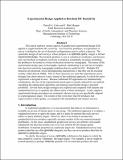| dc.description.abstract | This article explores various aspects of geophysical experimental design (ED)
applied to single-borehole DC resistivity. For resistivity problems, an experiment or
survey is defined as the set of electrode configurations used to collect a data-set. The
systematic design of such surveys, whose purpose is to optimally query a target, is termed
experimental design. The borehole problem is cast in cylindrical coordinates, and because
only one borehole is modeled, resistivity is treated as azimuthally invariant, permitting
the problem to be treated as a form of electrical resistivity tomography. The nature of the
experimental design space is thoroughly explored, culminating in several novel insights
into electrical resistivity tomography problems that are useful for ED. Multiple ED
functions are proposed, whose distinguishing characteristic is that they can be executed
serially, rather than en masse. That is, these functions are such that experiments can be
designed one observation at a time, instead of the traditional approach, in which the entire
experiment is designed at once. Because traditional ED approaches are fundamentally
combinatoric, the size of the experimental search space is greatly reduced by our method,
expediting the optimization algorithms and making experimental design a practical
possibility. Several basic design strategies are explored and compared with random and
standardized surveys to quantify the effectiveness of these techniques. Lastly, adaptive
experimental design procedures are examined, wherein surveys are specifically adapted
to a heterogeneous target. The results of this work show that ED produces real
improvements in data quality, as compared with standardized and random surveys. | en_US |
